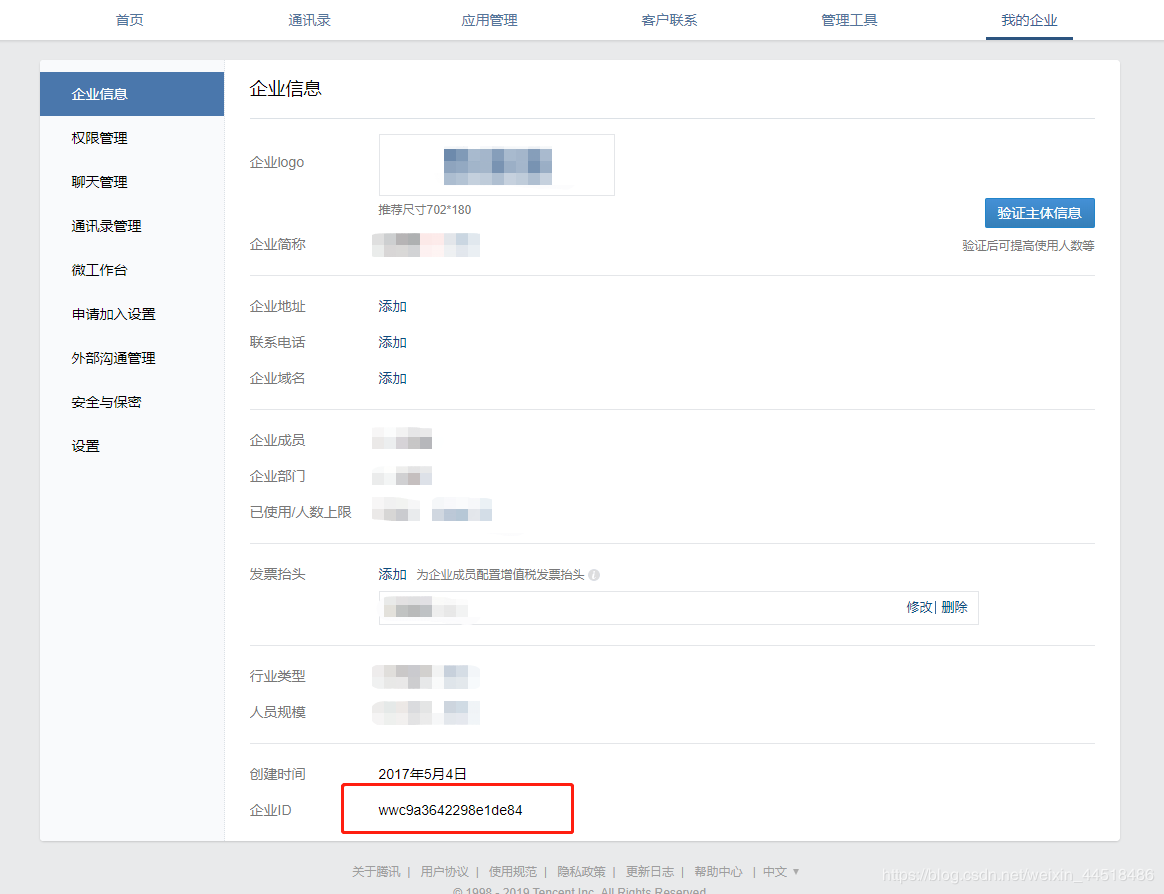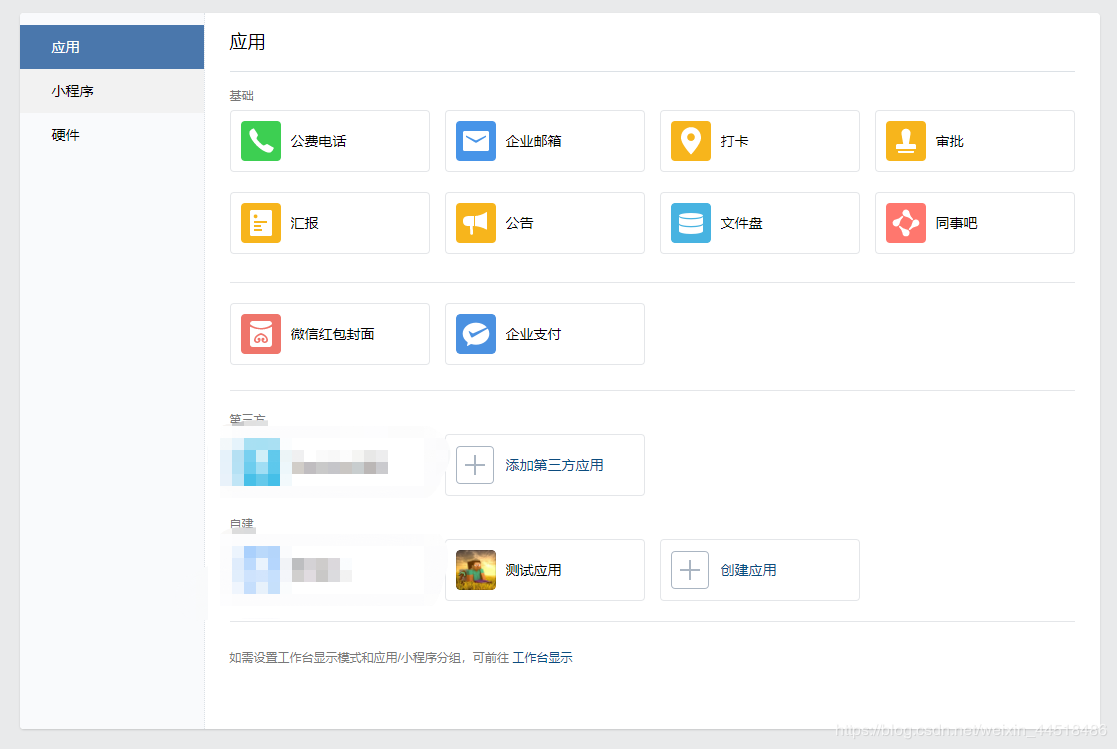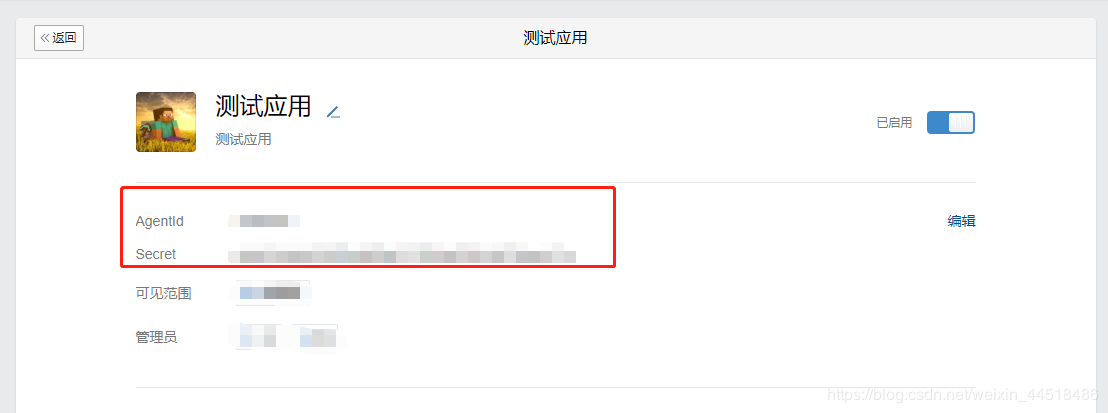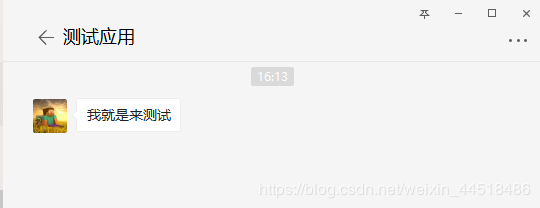net core WebApi——嘗試企業微信來開發企業內部應用
目錄
- 前言
- 企業微信
- 開始
- 測試
- 小結
@
前言
這幾天忙活著別的東西,耽誤了很長時間,從檔案操作完了之後就在考慮著下一步鼓搗點兒啥,因為最開始的業務開發就是企業微信相關的,這剛好來做個內部應用的小例子玩玩。
企業微信
前身是企業號,當時微信主推的還是公眾號與服務號,後續戰略考慮到企業的OA了(當然還是跟某個搶市場),企業號應該是在16年還是具體啥時候出的,剛出的時候也是問題不斷一直在修復更新,最近這兩年基本上沒咋關注企業微信了,也都是偶爾上去看看有沒有新東西啊什麼的,不過不得不說,在這幾年的成長中已經修復逐漸成為一個不錯的產品了(大廠的效率還是有的),相對於公眾號的開發,為什麼我選這個作為例子呢,因為企業微信我可以通過個人來使用(註冊的早,現在不清楚註冊流程,主要看是否需要企業認證),個人開發者在不論啥時候啥平臺都或多或少有些不友好(當然,認證了說明你是個好人,為了資訊保安,都懂)。
開始
註冊企業微信的流程我就不多說了,直接說註冊完成之後,我們來看下這個介面,標註的就是我們需要的關鍵引數。

記好這個東西之後,我們轉到應用管理。

這個建立就是你添張圖片打個名字而已,不多說,建立完成之後我們來看下圖的標記。

記好這兩個引數,OK,下來我們就來看API吧,這裡我只是介紹下訊息推送。
微信等相關的第三方開發大致流程都類似,如下:
- 註冊賬號(這不廢話麼)
- 賬號認證(為了許可權,當然企業微信內部應用不需要)
- 服務域名確定好
- AppID、Secret等等的配置(為了accesstoken)
- 幾乎所有的介面都是先獲取accesstoken,相當於你在微信的登入
- 根據介面文件來傳參啊獲取回撥啊獲取事件等等
- 根據返回值來看看錯誤資訊
我這裡不做服務端,只是寫個示例,需要服務端什麼的開發之類的可以給我聯絡,互相學習。
首先,在我們的Util新建一個類QyThirdUtil(名字感覺起的好沒水平,玩遊戲止於起名字,別人都10級了,我還在想名字),先把我們需要的配置資訊搞了。
private static string _CorpID = string.Empty; private static string _Secret = string.Empty; private static string _AgentID = string.Empty; /// <summary> /// 企業微信id /// </summary> public static string CorpID { get { if (string.IsNullOrEmpty(_CorpID)) { _CorpID = AprilConfig.Configuration["QyThird:CorpID"]; } return _CorpID; } } /// <summary> /// 企業微信應用祕鑰 /// </summary> public static string Secret { get { if (string.IsNullOrEmpty(_Secret)) { _Secret = AprilConfig.Configuration["QyThird:Secret"]; } return _Secret; } } /// <summary> /// 企業微信應用id /// </summary> public static string AgentID { get { if (string.IsNullOrEmpty(_Secret)) { _AgentID = AprilConfig.Configuration["QyThird:AgentID"]; } return _AgentID; } }
然後我們來劃分下方法,我們需要獲取accesstoken,需要執行傳送訊息的方法。
/// <summary>
/// 獲取AccessToken
/// </summary>
/// <returns></returns>
public static string GetAccessToken()
{
QyAccessToken accessToken = null;
bool isGet = false;
if (CacheUtil.Exists("QyAccessToken"))
{
accessToken = CacheUtil.Get<QyAccessToken>("QyAccessToken");
if (accessToken.Expire_Time >= DateTime.Now.AddMinutes(1))
{
isGet = true;
}
}
if (!isGet)
{
string url = $"https://qyapi.weixin.qq.com/cgi-bin/gettoken?corpid={CorpID}&corpsecret={Secret}";
//請求獲取
string res = RequestUtil.HttpGet(url);
accessToken = JsonConvert.DeserializeObject<QyAccessToken>(res);
if (accessToken != null && accessToken.ErrCode == 0)
{
accessToken.Expire_Time = DateTime.Now.AddSeconds(accessToken.Expires_In);
CacheUtil.Set("QyAccessToken", accessToken, new TimeSpan(2, 0, 0));
}
else
{
LogUtil.Error($"獲取accesstoken失敗——{accessToken.ErrCode},{accessToken.ErrMsg}");
}
}
return accessToken.Access_Token;
}這裡用到了兩個地方,一個是微信端回撥的物件例項QyAccessToken,需要的朋友可以在原始碼裡cv,我這裡就不貼出來了。
另一個是HttpClient的簡單封裝請求方法RequestUtil,看了有些部落格說HttpClient的生命週期之類的,有推薦直接例項化一個私有靜態的,也有做工廠模式建立的,沒細究,這塊兒要多注意下。
public class RequestUtil
{
/// <summary>
/// 發起POST同步請求
/// </summary>
/// <param name="url">請求地址</param>
/// <param name="postData">請求資料</param>
/// <param name="contentType">資料型別</param>
/// <param name="timeOut">超時時間</param>
/// <returns></returns>
public static string HttpPost(string url, string postData = null, string contentType = null, int timeOut = 30)
{
if (string.IsNullOrEmpty(postData))
{
postData = "";
}
using (HttpClient client = new HttpClient())
{
client.Timeout = new TimeSpan(0, 0, timeOut);
using (HttpContent httpContent = new StringContent(postData, Encoding.UTF8))
{
if (contentType != null)
httpContent.Headers.ContentType = new System.Net.Http.Headers.MediaTypeHeaderValue(contentType);
HttpResponseMessage response = client.PostAsync(url, httpContent).Result;
return response.Content.ReadAsStringAsync().Result;
}
}
}
/// <summary>
/// 發起POST非同步請求
/// </summary>
/// <param name="url">請求地址</param>
/// <param name="postData">請求資料</param>
/// <param name="contentType">資料型別</param>
/// <param name="timeOut">超時時間</param>
/// <returns></returns>
public static async Task<string> HttpPostAsync(string url, string postData = null, string contentType = null, int timeOut = 30)
{
if (string.IsNullOrEmpty(postData))
{
postData = "";
}
using (HttpClient client = new HttpClient())
{
client.Timeout = new TimeSpan(0, 0, timeOut);
using (HttpContent httpContent = new StringContent(postData, Encoding.UTF8))
{
if (contentType != null)
httpContent.Headers.ContentType = new System.Net.Http.Headers.MediaTypeHeaderValue(contentType);
HttpResponseMessage response = await client.PostAsync(url, httpContent);
return await response.Content.ReadAsStringAsync();
}
}
}
/// <summary>
/// 發起GET同步請求
/// </summary>
/// <param name="url">請求地址</param>
/// <returns></returns>
public static string HttpGet(string url)
{
using (HttpClient client = new HttpClient())
{
return client.GetStringAsync(url).Result;
}
}
/// <summary>
/// 發起GET非同步請求
/// </summary>
/// <param name="url">請求地址</param>
/// <returns></returns>
public static async Task<string> HttpGetAsync(string url)
{
using (HttpClient client = new HttpClient())
{
HttpResponseMessage response = await client.GetAsync(url);
return await response.Content.ReadAsStringAsync();
}
}
}然後我們來寫個傳送訊息的方法SendMessage,這裡我只寫了下普通文字推送。
/// <summary>
/// 訊息推送
/// </summary>
/// <param name="content">文字內容</param>
/// <param name="range">推送範圍</param>
/// <param name="messageType">訊息型別</param>
/// <returns></returns>
public static bool SendMessage(string content, MessageRange range, AprilEnums.MessageType messageType)
{
bool isSend = false;
if (string.IsNullOrEmpty(content) || content.Length > 2048 || range==null)
{
return false;
}
string accessToken = GetAccessToken();
if (string.IsNullOrEmpty(accessToken))
{
return false;
}
string url = $"https://qyapi.weixin.qq.com/cgi-bin/message/send?access_token={accessToken}";
StringBuilder data = new StringBuilder();
bool isVaildRange = false;
if (range.IsAll)
{
data.Append($"\"touser\":\"@all\"");
isVaildRange = true;
}
else
{
if (range.Users != null && range.Users.Count > 0)
{
data.AppendFormat("\"touser\" : {0}", GetRangeValue(range.Users));
isVaildRange = true;
}
if (range.Tags != null && range.Tags.Count > 0)
{
if (data.Length > 0)
{
data.Append(",");
}
data.AppendFormat("\"totag\" : {0}", GetRangeValue(range.Tags));
isVaildRange = true;
}
if (range.Departments != null && range.Departments.Count > 0)
{
if (data.Length > 0)
{
data.Append(",");
}
data.AppendFormat("\"totag\" : {0}", GetRangeValue(range.Departments));
isVaildRange = true;
}
}
if (!isVaildRange)
{
//沒有傳送範圍
return false;
}
data.AppendFormat(",\"msgtype\":\"{0}\"", GetMessageType(messageType));
data.AppendFormat(",\"agentid\":\"{0}\"", AgentID);
data.Append(",\"text\": {");
data.AppendFormat("\"content\":\"{0}\"", content);
data.Insert(0, "{");
data.Append("}}");
LogUtil.Debug($"獲取到傳送訊息請求:{data.ToString()}");
string res = RequestUtil.HttpPost(url, data.ToString(), "application/json");
LogUtil.Debug($"獲取到傳送訊息回撥:{res}");
return false;
}簡單說下訊息推送,第一個就是你的推送型別,是普通文字還是啥(文件都有,我這淨扯淡),然後就是你的範圍,再然後就是你的推送內容了,當然根據不同的推送型別你的內容引數也不同,需要進一步封裝的朋友可以去看下API。
測試
我們在控制器中(不再說Values了)加上訊息推送的測試,這裡的範圍可以在你自己的通訊錄中檢視。
[HttpGet]
public ActionResult<IEnumerable<string>> Get()
{
//…
MessageRange range = new MessageRange();
range.Users = new List<string>();
range.Users.Add("10001");
QyThridUtil.SendMessage("我就是來測試", range, AprilEnums.MessageType.Text);
//…
}

小結
寫到這裡基本上都結束了,為什麼我特意拿出來企業微信的內部應用來寫這篇呢,其實是做下這個訊息推送,以後的自己的工程就可以寫個這個然後做異常警告之類的東西,這樣想想這篇就不是廢話了,程式設計的奇淫技巧(咳咳,樂趣,樂趣)就在於此,程式碼自己敲,東西自己組,全在於你自己怎麼玩了。
